Ueno Station: Complete Guide to Railway Lines and Accessibility

With Ameyoko and Ueno Park nearby, Ueno Station is a good starting point if you want to explore Tokyo. Did you know there are four Ueno Stations? Don't worry, we introduce the differences between them, and how to get to your destination.
There is more than One Ueno Station?
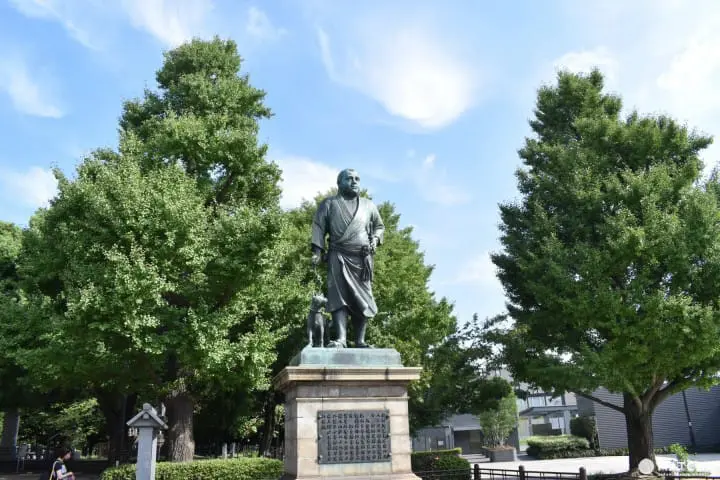
The symbol of Ueno, Saigo Takamori Statue
When talking about Ueno usually the area of Ameya Yokocho (Ame-Yoko), with numerous stores selling food, clothes, miscellaneous goods, and jewelry and Ueno Park, famous for its beauty and many museums, come to mind.
The nearest station to these locations is Ueno Station but you might be surprised to find out this term refers to several stations gathered in one place. However, there is no reason to be scared. We are here to compare all of them and explain how to get to the “other” Ueno Stations from the one most frequently used, JR Ueno Station.
The following passes and tickets are convenient and will save yen on travel in and around Ueno and the rest of Tokyo: Tokyo Subway Ticket (24, 48, and 72-hour passes available), Japan Rail Pass, Suica IC Card Reservation
The Four Different Ueno Stations
| Route Name | Main Stations along the Route |
| JR Ueno Station | Tokyo Station, Akihabara Station (Yamanote Line), Yokohama Station (Keihin Tohoku Line), Tohoku Shinkasen, Hokuriku Shinkansen |
| Tokyo Metro Ueno Station of the Ginza Line |
Asakusa, Ginza, Omotesando, Shibuya |
| Tokyo Metro Ueno Station of the Hibiya Line |
Akihabara, Tsukiji, Ginza, Roppongi |
| Keisei Ueno Station of the Keisei Line | Narita Airport |
You can see all existing Ueno Stations above. If you click on any of them, the link will lead you to the explanation section of the according station.
Besides the ones mentioned, there are two slightly different stations as well, Ueno-Hirokoji Station and Ueno-Okachimachi Station. You can find an additional section regarding these two at the end of this article.
Let us introduce each station, and the route you have to take to get there from JR Ueno Station.
1. JR Ueno Station – The Main Station
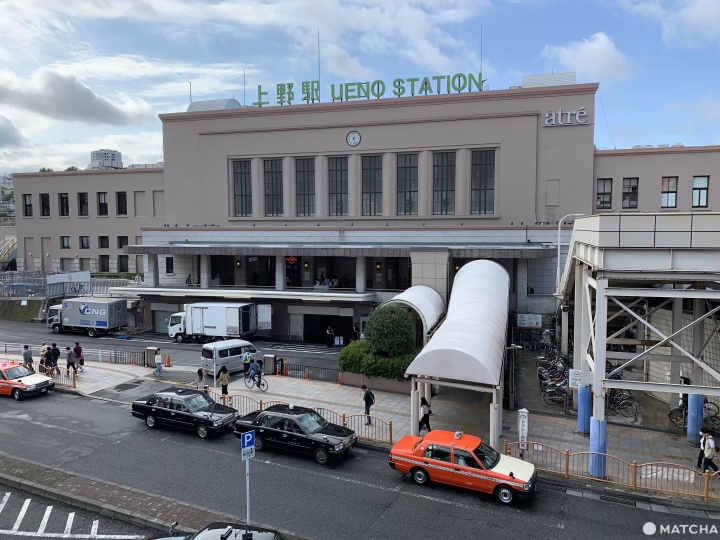
JR Ueno Station is known as Ueno’s main station. The building itself is large, so it is very easy to find and use it.
Some of the lines serving JR Ueno Station are Keihin Tohoku Line (bound for Yokohama), Yamanote Line (bound for Akihabara and Tokyo), Joban Line (bound for Chiba Prefecture). Shinkansen trains bound for Tohoku and Hokuriku also depart from Ueno Station.
The whole station functions as one business facility, with two shopping areas located inside. Upon passing the ticket gates (the inner zone), you’ll find Ecute (Japanese only. Outside the ticket gates (the outer zone), you can indulge in some shopping at Atré (a machine-translated site is available).
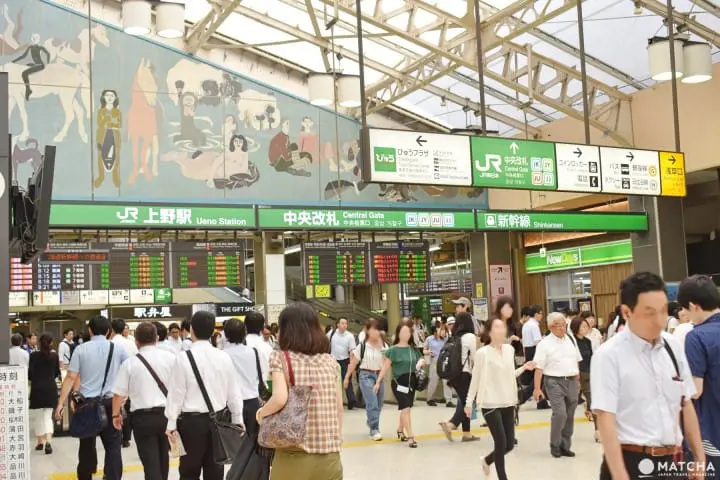
This is the main ticket gate at JR Ueno Station. If you follow the green JR sign from the outside of the building, you are will eventually arrive at this gate. All of the ticket gates at JR Ueno Station are located above ground. Please be careful not to end up underground!
There are a few other ticket gates besides the main gate. If you go to the station from Ame-Yoko, the closest ticket gates are the main gate and Shinobazu Gate. As for the Ueno Park, the closest gate is Koen Gate (Park Gate). For more information on this topic, take a look at Navigating JR Ueno Station.
2. Ueno Metro Station – Leading to the Main Tourist Spots in Tokyo

At Tokyo Metro Ueno Station (subway), you can use two lines, the Ginza and the Hibiya line. The Ginza Line leads to Asakusa, Ginza, Omotesando, and Shibuya station, and is very useful if you intend to visit some of the main attractions Tokyo has to offer.
For Asakusa, get on a train bound for Asakusa. You will need about 5 minutes to get there. If you want to visit the fashion-sensibility-capital Omotesando or the shopping haven Shibuya, take the train bound for Shibuya.
If you ride on the Hibiya Line, you can head for Akihabara, Tsukiji, Ginza, or Roppongi (Japanese). Akihabara is known for its anime culture, at Tsukiji, you’ll discover a world of sushi and seafood while Roppongi is a bustling shopping area overflowing with bars, clubs, and fancy restaurants.
There are many tourist attractions along the Ginza and Hibiya lines, so we suggest making Ueno your starting point for your Tokyo sightseeing.
How to Get on Ginza and Hibiya Lines from the JR Station
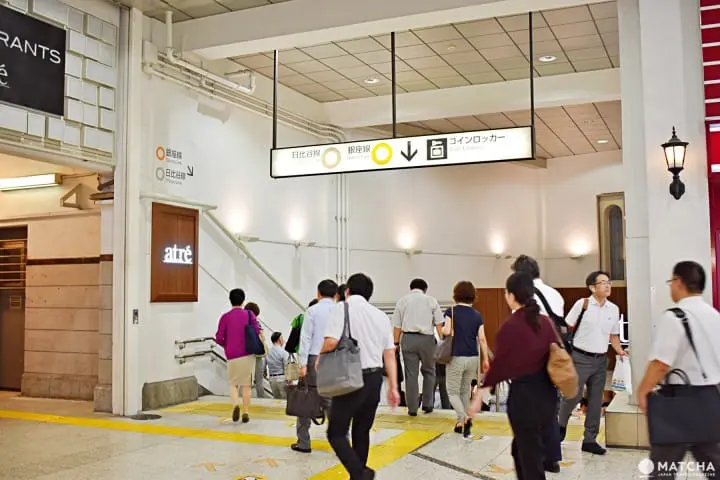
Let us explain how to get from the JR Ueno Station’s main gate to the Ueno Stations of the Ginza and the Hibiya Lines. As both of them are located underground, the ticket gates are below ground, as well.
Just after you pass the main gate of the JR station, on the left side you’ll see stairs leading towards the underground area (seen in the photo above).
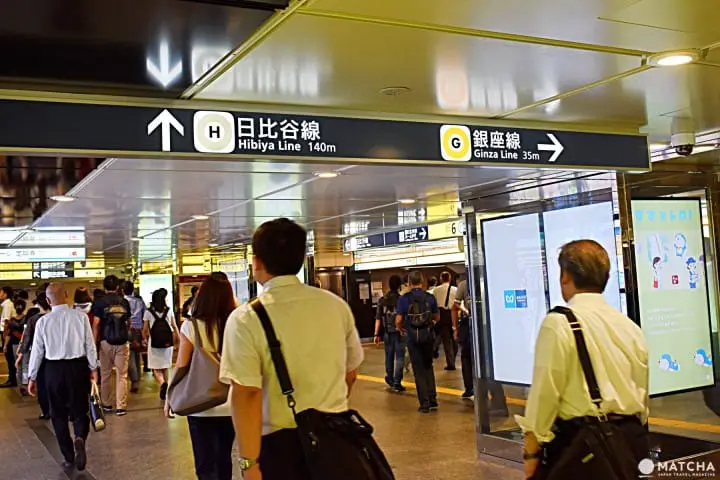
If you follow the crowd heading downstairs, the first thing you’ll notice on the right side is the ticket gate for the Ginza Line. If you go further on, you’ll arrive in front of the ticket gate for the Hibiya Line. It is useful to remember that the orange mark is for the Ginza Line, and the silver mark is for Hibiya Line. You can follow the directions written on the information boards hanging above you.
3. Keisei Line Ueno Station – The Way to Narita Airport
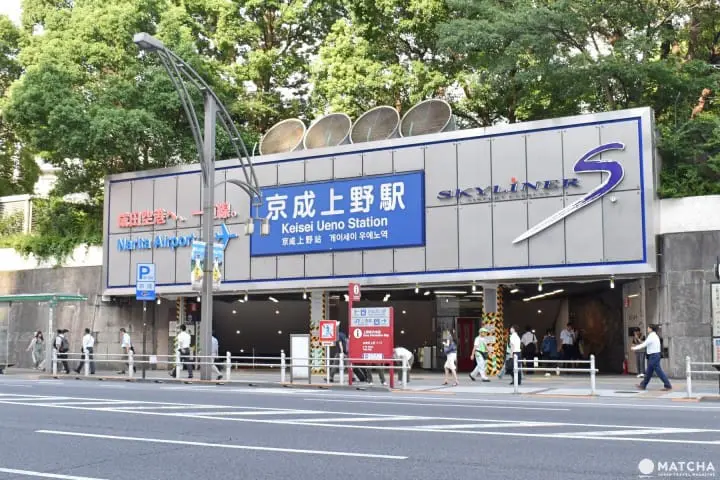
Be careful when heading to the Keisei Line Ueno Station. It is located not more than 5 minutes by foot from JR Ueno Station but in a whole different building. The Keisei Line directly brings you to Narita Airport and other destinations in that direction.
How to Get to the Keisei Line from JR Station
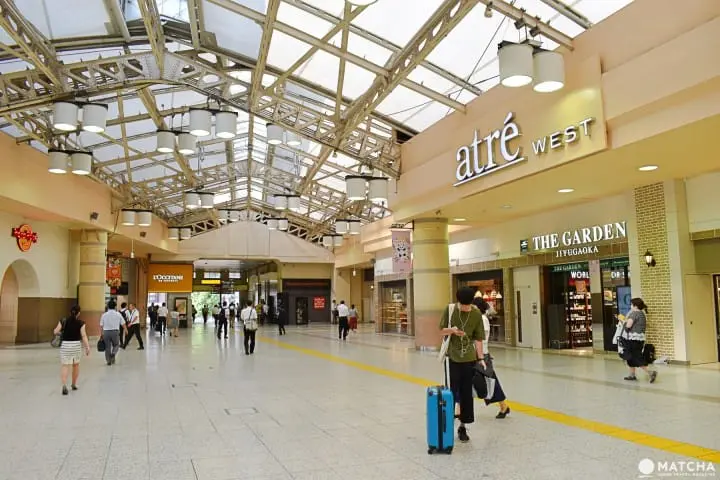
If the JR Ueno Station is your starting point, pass the main ticket line and head on straight.
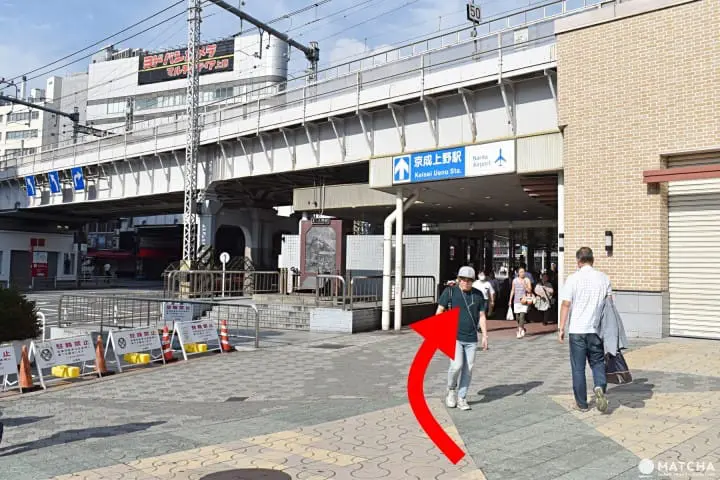
Turn right after you get out of the station building.
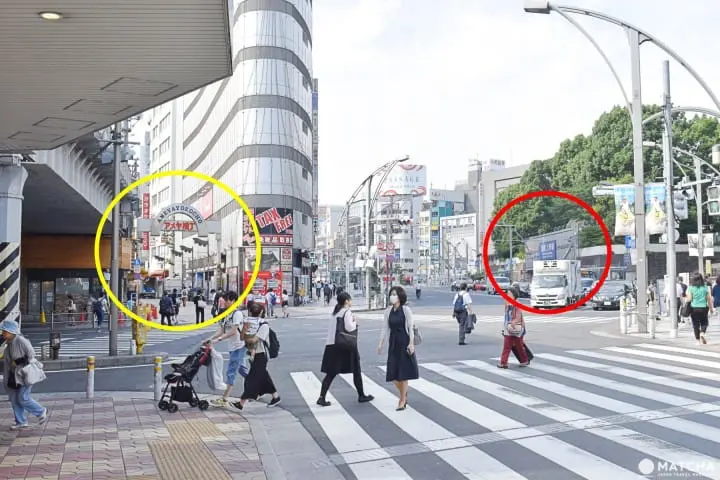
As you follow the passage under the tracks, you’ll see a pedestrian crossing nearby. Ameya Yokocho (yellow circle) should be visible on your left side. Cross the street and walk a little longer and you’ll arrive at the Keisei Ueno Station (red circle).
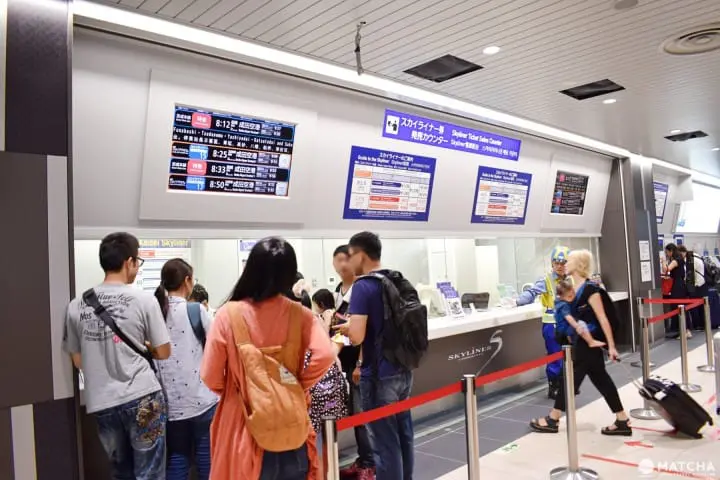
When you enter the building of Keisei Ueno Station, you’ll notice a counter where you can buy tickets for the Skyliner limited-express train only. This is a service for anyone who wishes to get to Narita Airport as fast as possible without switching trains or buses. It only takes about 45 minutes and costs 2,470 yen.
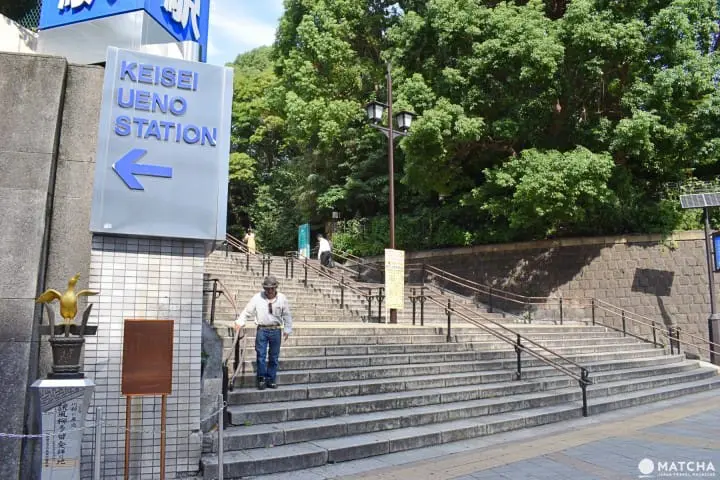
The stairs beside Keisei Ueno Station lead to the Ueno Park.
Ueno-Hirokoji Station and Ueno-Okachimachi Station
As mentioned before, apart from the Ueno stations we listed earlier in the article, there are also Ueno-Hirokoji Station and Ueno-Okachimachi Station. To avoid possible misunderstandings and missed trains let us tell you how to differentiate the two.
Ueno-Hirokoji Station
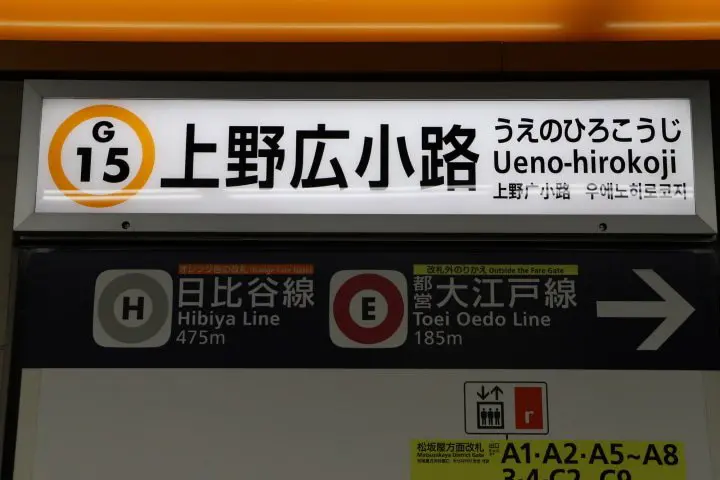
photo by pixta
Ueno-Hirokoji Station belongs to the Tokyo Metro Ginza Line. It is the next stop following Ueno Station. As you can see, it has Ueno in the name as well, so pay attention not to get off at the wrong station.
If you do get off at the wrong station, note that it takes around 10 minutes by foot to the Ginza Line Ueno Station. The Ueno-Hirokoji Station building is connected to Matsuzakaya (a machine-translated site available) department store.
Ueno-Hirokoji Station Google Map
Ueno-Okachimachi Station
Although Toei Oedo Ueno-Okachimachi Station connects to Nishi-Shinjuku Station, it doesn’t really lead to any of Tokyo’s famous sightseeing spots like other Ueno stations. It is located at the same place as Ueno-Hirokoji Station (underground).
Ueno-Okachimachi Station Google Map
When in Trouble, Ask at the Information Desk
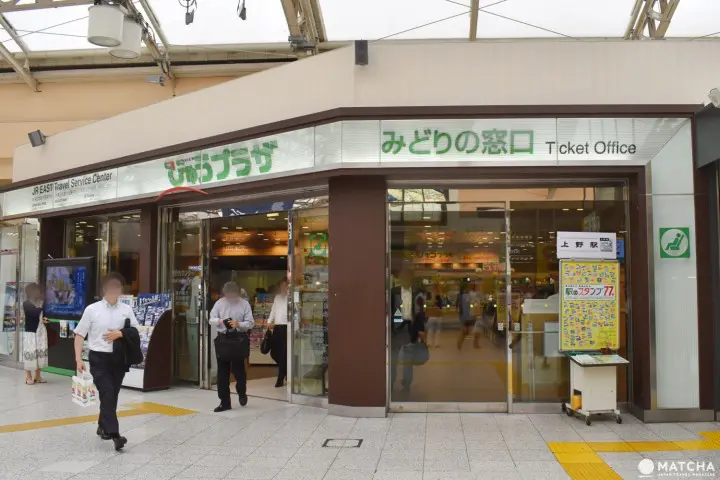
If you get lost between all the available lines and stations around Ueno, on the right side of the front ticket gate you’ll find a Travel Service Center where you can ask for the way. You can also buy Shinkansen tickets there.
Another option is to ask the station staff or at the police office if you can't find the Travel Service Center.
On Rainy Days, Use the Underground Passage
All six Ueno Stations, including Ueno-Hirokoji Station and Ueno-Okachimachi Station, are connected by a giant underground passage. This passage can provide shelter on a rainy day.
If you’re looking for the underground passage at JR Ueno Station, just head downstairs in toward the Tokyo Metro.
Now, you can go and conquer Ueno Station in order to make the best out of your Tokyo travel!
Read also
Writer: Miku Yasuda
The original article was published on August 14, 2015.
This is the official account of MATCHA's editorial department. Our articles feature useful travel information for visitors to Japan, from how-to guides to recommended places to visit.


















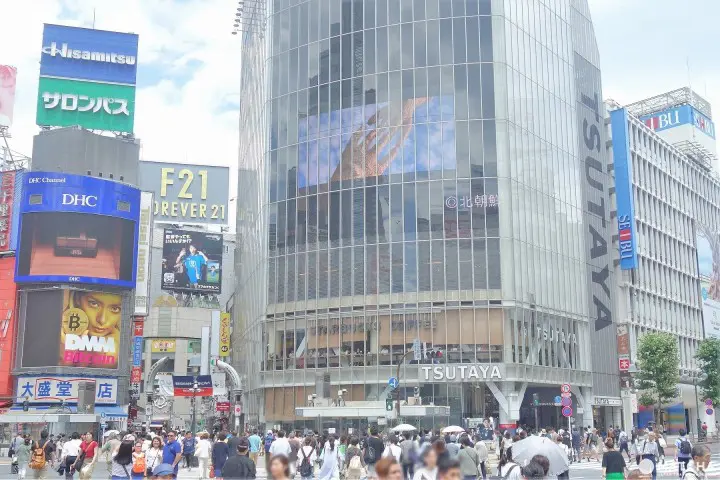

























![[During Your Kumano Trip] Dorokyo Meguri no Sato Kumano River](https://resources.matcha-jp.com/resize/720x2000/2025/11/05-249123.jpeg)
![[Kagoshima] Enjoy Minamisatsuma City to the Fullest! A Guide to the Scenic Beauty and Culture of Five Areas](https://resources.matcha-jp.com/resize/720x2000/2026/02/15-258755.webp)
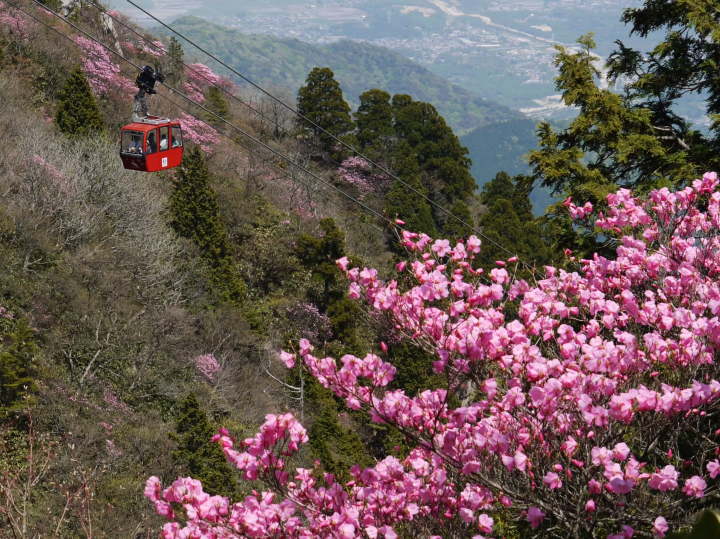
![[Yufuin]Yufuin in 100 Minutes: Quick Access Guide](https://resources.matcha-jp.com/resize/720x2000/2026/02/15-258738.webp)
![[Shinjuku Nishiguchi HALC] About the d Point Campaign](https://resources.matcha-jp.com/resize/720x2000/2026/02/14-258714.webp)